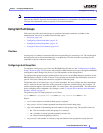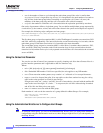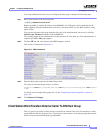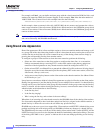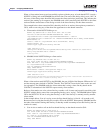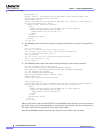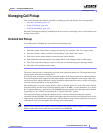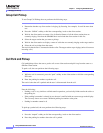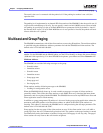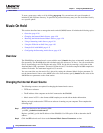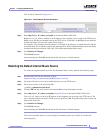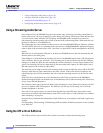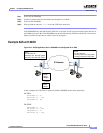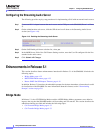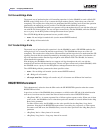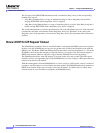
4-27
Linksys SPA9000 Administrator Guide
Document Version 3.01
Chapter 4 Configuring SPA9000 Features
Multicast and Group Paging
The result is the user is connected with the parked call. If the parking lot number is not valid, the
operation fails.
The parking lot is implemented as an internal SIP client station of the SPA9000. It has the special user-id
callpark and can handle up to 10 calls. You can specify a music on hold (MOH) server to be used with
call parking by specifying it in the <Call Park MOH Server> parameter (which by default is “imusic”,
the internal music source). If <Call Park MOH Server> is not specified or invalid, the parked call hears
silence while the call is parked.
Multicast and Group Paging
The SPA9000 communicates with all the client stations at once using IP multicast. The multicast address
is specified using the <Multicast Address> parameter for both the SPA9000 and client stations. The
default value is 224.168.168.168:6061.
Note Make sure that the SPA9000 and the SPA900 Series phones use the same multicast address and port
number. For the SPA9000 and the SPA901 phone, use the IVR to identify or change the current address
(180# and 181# respectively). For other SPA900 Series phones, press Menu and select Network > 15
Multicast Address.
The SPA9000 can send the following messages to the group:
• Graceful reboot
• Immediate reboot
• Graceful restart
• Immediate restart
• Group page start
• Group page end
• Get ringing calls
Client stations send the following message to the SPA9000:
• Looking for configuration server
When the SPA9000 initially boots up, it sends a multicast message to request all client stations to
gracefully reboot. This allows the client stations to redo DHCP discovery, download the latest phone
parameters, and also register with the SPA9000. The SPA9000 does not store any DHCP lease states and
client registration states in Flash memory.
In addition to group management, IP multicast is also used in the group paging application, where the
announcer sends RTP packets to an IP multicast address at which all the other client stations are
listening. This address is chosen by the SPA9000 and is configured using the <Group> parameter. The
default value is 224.168.168.168:34567.
Group paging lets the user page all the client stations at once. If the client station is on a call while a
group page starts, the call is automatically placed on hold. The speaker on the paged stations is turned
on automatically unless the handset or headset is being used. Group page is one-way only. The paged
client stations can only listen to the call from the originator.



